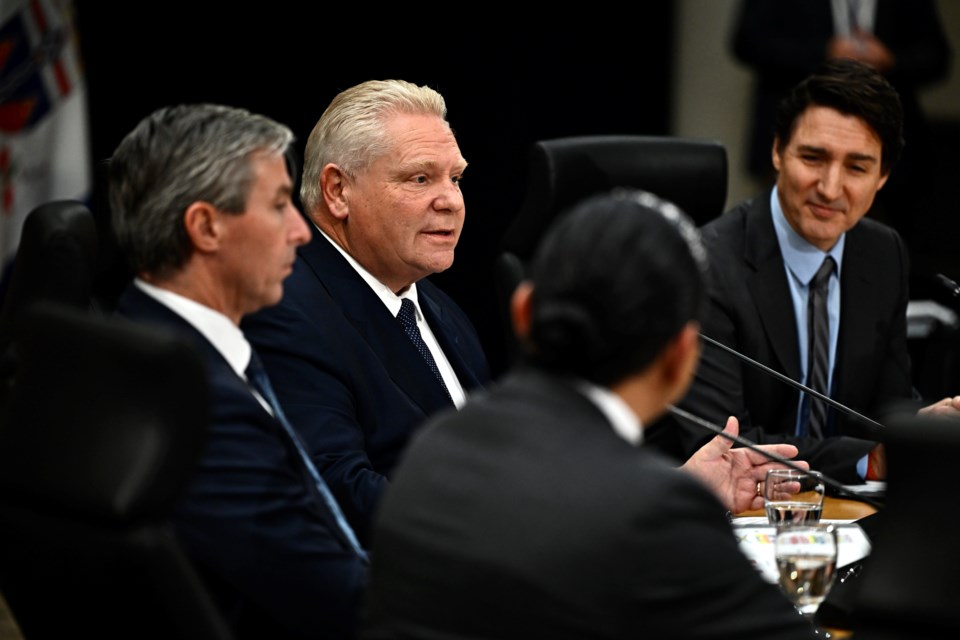EDITOR’S NOTE: This article originally appeared on The Trillium, a Village Media website devoted to covering provincial politics at Queen’s Park.
Premier Doug Ford went into Wednesday's first ministers' meeting in Ottawa calling for all premiers to put the needs of the country as a whole before the needs of their "individual jurisdictions" so that Canada can have a unified response to the threat of sweeping tariffs from the United States.
But that didn't happen.
Instead, Alberta Premier Danielle Smith proved to be the one holdout. She refused to sign the joint statement the premiers and federal government released at the end of the day and declared on social media that "Alberta will simply not agree to export tariffs on our energy or other products."
Going into the meeting on Wednesday morning, Ford acknowledged that each province has its individual concerns about the economic impact of retaliation against American tariffs but argued that "country comes first over (individual) jurisdictions," and that Canada needs to have a strong and united retaliatory response.
"I understand different jurisdictions around the country have their concerns. But nothing is more important than standing united," he said, noting that every province has important exports to the U.S., such as critical minerals in Ontario, Potash in Saskatchewan, and electricity exports from Quebec.
"Nothing's more important than the country, and when we're defending the country, we don't roll over.”
When asked if Quebec would be willing to cut off its electricity exports to the United States for the sake of maintaining a united front, Premier Francois Legault did not rule it out, saying that "everything is on the table."
Smith did not attend the first ministers' meeting in person because she is on vacation in Panama. When she did join the meeting virtually, Quebec Premier François Legault reportedly quipped, “Is she in Mar-a-Lago?”
Although they tried to downplay it, it was clear at the end of the discussions yesterday there was little consensus on what form Canada's retaliation should take.
Prime Minister Justin Trudeau said in French that the first ministers talked about various steps Canada could take to retaliate, but since they don't know yet what tariffs Trump will impose, so they can't decide today what to do in retaliation, but they agree on the initial steps that should be taken.
Trudeau said that "no one region of the country should disproportionately bear the burden of standing up for all other Canadians," promising that revenues from the retaliatory tariffs would be redistributed to help ease the economic consequences.
Ford, meanwhile, noted that Canada is still far less internally divided than the U.S.
"Isn't this great, that we have (premiers from multiple political parties) sitting down and we have a robust conversation? We may agree or disagree, but we're coming out united," said Ford.
"You would never see a group of Democrats and Republicans sitting here collaboratively."
While the press conference was underway, Smith posted on social media that she had "a constructive discussion" with the other premiers on how to address the tariff threats and that she had "agreed on several strategies" but continued to insist that cutting off oil and gas to the U.S. is unacceptable.
"We will take whatever actions are needed to protect the livelihoods of Albertans from such destructive federal policies," she vowed.
Smith noted that Alberta has been pushing for the construction of a pipeline to the Pacific Ocean to allow its oil and gas to reach international markets other than the United States for decades, only to have those projects stymied by environmental and Indigenous opposition.
She suggested this is "an opportunity to correct the misguided direction of this country ... instead of effectively landlocking them and keeping us fully reliant on one primary customer."
When asked about Smith's post, Ford said he respects Smith and the fact "she is concerned about protecting her energy."
"That is her choice. But I have a little different theory that when protecting jurisdiction, the country comes first. Canada is the priority ... When the tariffs come, it's going to affect Albertans, it's going to affect people from B.C., Saskatchewan, Manitoba, and Ontario, all the way down the road. No one's exempt from that," said Ford.
"(Donald Trump) is sitting there with a big smile on his face thinking, 'Wow, I'm going to divide and conquer.' Remember one thing: united we stand, divided we fall."
The prime minister argued that Trump is out to destroy Ontario's automotive industry, not Alberta's oil and gas sector.
"You don't hear Doug saying, 'No matter what, we have to protect (the auto industry) at the expense of everything else," said Trudeau. "He's a Canadian first, as much as he is passionate about Ontario. I think that's something we all share across this table."



